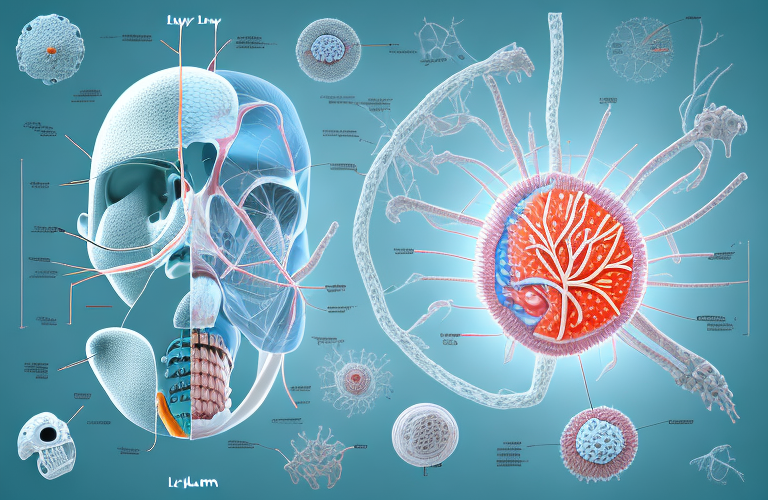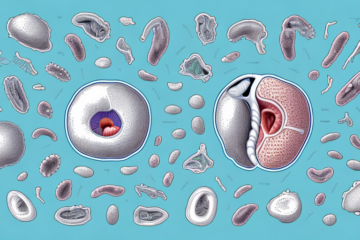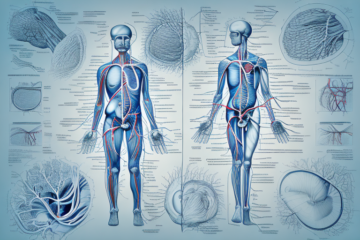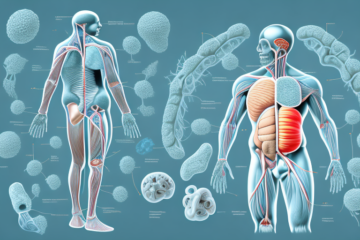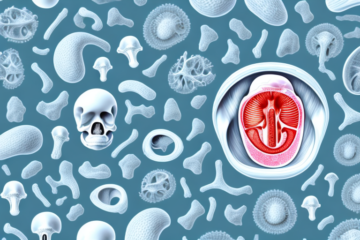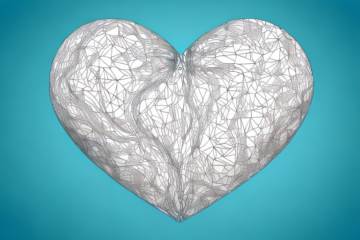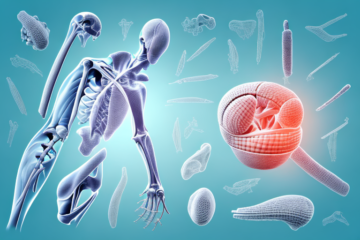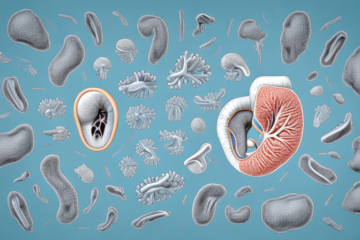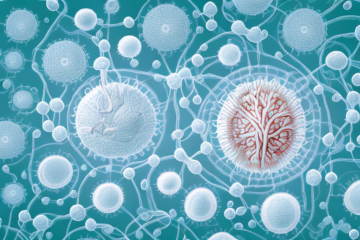The lymphatic system is a complex network of vessels, nodes, and organs that play a critical role in maintaining the body’s health by helping to fight off infections and disease. Lymph nodes are central to the function of the lymphatic system as they act as filters that trap and destroy harmful substances in the body. In this comprehensive overview, we will explore the anatomy and function of lymph nodes, common medical conditions associated with lymph node dysfunction, and effective treatments for lymph node disorders.
Understanding the Lymphatic System: A Comprehensive Overview
The lymphatic system is composed of vessels, nodes, and organs that work together to remove excess fluid from the body and filter out waste products and harmful substances. Lymphatic vessels carry lymph, a transparent fluid, throughout the body. When lymph fluid enters the lymph nodes, immune cells within the nodes help to destroy harmful substances such as bacteria and viruses. The filtered lymphatic fluid then returns to the bloodstream. The lymphatic system is central to the body’s immune defenses and plays a critical role in both maintaining health and fighting off infections and diseases.
In addition to its role in immune defense, the lymphatic system also plays a crucial role in maintaining fluid balance within the body. When excess fluid accumulates in the tissues, the lymphatic vessels work to remove it and return it to the bloodstream. This helps to prevent swelling and edema, which can be uncomfortable and even dangerous in some cases.
Disorders of the lymphatic system can have serious consequences for overall health. Lymphedema, for example, is a condition in which the lymphatic vessels are unable to properly drain fluid from the tissues, leading to swelling and discomfort. Understanding the lymphatic system and its functions is therefore essential for maintaining good health and preventing disease.
The Role of Lymph Nodes in Immune Function
Lymph nodes are essential components of the immune system as they contain high concentrations of immune cells, including lymphocytes and macrophages, which help to defend the body against foreign substances such as toxins, bacteria, and viruses. Lymphocytes are white blood cells that play a central role in the body’s immune response, particularly in the production of antibodies that help to identify and destroy harmful substances. Macrophages are large cells that engulf and digest foreign substances.
In addition to their role in immune defense, lymph nodes also play a crucial role in the spread of cancer. Cancer cells can travel through the lymphatic system and become trapped in lymph nodes, where they can grow and multiply. This is why doctors often check for enlarged lymph nodes as a sign of cancer.
Furthermore, lymph nodes can become swollen and tender in response to infection or inflammation in the body. This is a sign that the immune system is actively fighting off an invader. Swollen lymph nodes can occur in various parts of the body, including the neck, armpits, and groin.
How Lymph Nodes Filter and Drain Fluids
Lymph nodes act as filters that trap and destroy harmful substances in the body, such as bacteria, viruses, and cancer cells. When lymphatic fluid enters the nodes, it is filtered through the nodes’ network of channels. Immune cells within the nodes identify and attack harmful substances, breaking them down and neutralizing them. The filtered lymphatic fluid then drains out of the lymph nodes and eventually into the bloodstream, where it is recirculated through the body.
In addition to filtering harmful substances, lymph nodes also play a crucial role in the body’s immune response. When the immune system detects an infection or other threat, it sends immune cells to the affected area. These immune cells can travel through the lymphatic system and accumulate in the lymph nodes closest to the infection. This causes the lymph nodes to swell and become tender, which is a sign that the immune system is actively fighting off the threat. Once the threat has been neutralized, the immune cells will leave the lymph nodes and return to the bloodstream.
The Anatomy of Lymph Nodes: Size, Shape, and Location
Lymph nodes are small, oval-shaped structures that vary in size from a few millimeters to over a centimeter in diameter. They are located throughout the body, primarily in the neck, armpits, chest, abdomen, and groin regions. Lymph nodes are connected by lymphatic vessels that carry lymphatic fluid to and from the nodes. Each lymph node contains a network of channels called sinuses that are lined with immune cells.
The size, shape, and location of lymph nodes can vary depending on a person’s age, gender, and overall health. In general, lymph nodes tend to be larger in children and decrease in size as a person ages. Additionally, certain medical conditions, such as infections or cancer, can cause lymph nodes to become enlarged or tender.
It is important to note that while lymph nodes are an important part of the immune system, they can also be affected by diseases such as lymphoma or leukemia. If you notice any unusual swelling or tenderness in your lymph nodes, it is important to speak with a healthcare professional for proper evaluation and treatment.
Different Types of Lymph Nodes in the Body
There are many different types of lymph nodes in the body that are located in specific regions. For example, cervical lymph nodes are located in the neck, axillary lymph nodes are located in the armpits, and inguinal lymph nodes are located in the groin. Each type of lymph node has a unique structure and function and plays a critical role in the immune defense system.
The mesenteric lymph nodes are located in the abdomen and are responsible for filtering lymphatic fluid from the intestines. They play a crucial role in preventing the spread of infections and cancer cells from the intestines to other parts of the body. The mesenteric lymph nodes are also important in the absorption of fats and fat-soluble vitamins from the digestive system.
The popliteal lymph nodes are located behind the knee and are responsible for draining lymphatic fluid from the lower leg and foot. They play a critical role in the immune defense system by filtering out harmful substances and pathogens from the lymphatic fluid. The popliteal lymph nodes can become swollen and tender in response to infections or injuries in the lower leg or foot.
Causes and Symptoms of Swollen Lymph Nodes
Swollen lymph nodes are a common medical condition that can be caused by a variety of factors, including infections, inflammation, and cancer. Symptoms of swollen lymph nodes may include pain, tenderness, and swelling in the affected area. In some cases, other symptoms such as fever, fatigue, and night sweats may also be present.
If you notice swollen lymph nodes, it is important to seek medical attention to determine the underlying cause. Infections such as the common cold or flu can cause swollen lymph nodes, but they can also be a sign of a more serious condition such as lymphoma or leukemia. Your doctor may perform tests such as blood work or a biopsy to determine the cause of the swelling and develop an appropriate treatment plan.
Diagnosing Lymph Node Disorders: Tests and Procedures
Diagnosing lymph node disorders may involve a variety of tests and procedures, such as imaging tests like CT scans or MRIs, blood tests, or biopsies. The specific test or procedure used will depend on the suspected cause of the lymph node disorder.
One common imaging test used to diagnose lymph node disorders is a PET scan, which can help determine if the lymph nodes are cancerous or not. Another procedure that may be used is lymph node mapping, which involves injecting a dye into the lymphatic system to help identify the location of the affected lymph nodes.
In some cases, a doctor may also perform a lymph node dissection, which involves surgically removing one or more lymph nodes for further testing. This procedure is typically done if cancer is suspected or if other diagnostic tests have been inconclusive.
Common Medical Conditions Associated with Lymph Node Dysfunction
Medical conditions associated with lymph node dysfunction can range from minor infections to serious and life-threatening conditions. Common medical conditions that affect lymph nodes include lymphadenitis, lymphoma, and leukemia.
Lymphadenitis is a medical condition that occurs when the lymph nodes become inflamed due to an infection. This condition can cause swelling, pain, and tenderness in the affected area. It is commonly caused by bacterial infections, such as strep throat or staph infections.
Lymphoma and leukemia are types of cancer that can affect the lymphatic system. Lymphoma is a cancer that affects the lymphocytes, which are white blood cells that help fight infections. Leukemia is a cancer that affects the blood and bone marrow, where blood cells are produced. Both of these conditions can cause lymph node enlargement, fatigue, and other symptoms.
Treatments for Lymph Node Disorders: Medications, Surgery, and More
The treatment for lymph node disorders will depend on the specific condition and its severity. Treatment options may include medications such as antibiotics, antivirals, and immunosuppressive drugs, as well as surgery to remove lymph nodes or cancerous tissue. In some cases, radiation therapy may also be used to treat lymph node disorders.
In addition to these traditional treatment options, there are also alternative therapies that may be used to manage lymph node disorders. These can include acupuncture, massage therapy, and herbal remedies. While these alternative therapies may not be as well-studied as traditional treatments, some people find them to be helpful in managing their symptoms and improving their overall quality of life.
Natural Ways to Boost Your Immune System and Support Healthy Lymphatic Function
The immune system and lymphatic system are closely interconnected, and taking steps to boost your immune system can also support healthy lymphatic function. Natural methods to boost the immune system may include eating a healthy and balanced diet, getting regular exercise, and getting enough sleep. Herbs and supplements such as echinacea and zinc may also help to support immune function and lymphatic health.
In addition to these natural methods, reducing stress levels can also have a positive impact on both the immune and lymphatic systems. Stress can weaken the immune system and impair lymphatic function, so incorporating stress-reducing practices such as meditation, yoga, or deep breathing exercises can be beneficial. Additionally, staying hydrated by drinking plenty of water can help to flush toxins out of the body and support lymphatic function.
Lifestyle Tips for Managing Swollen or Enlarged Lymph Nodes
In addition to medical treatments, there are many lifestyle tips that may help to manage swollen or enlarged lymph nodes. These may include avoiding smoking and exposure to environmental toxins, maintaining good hygiene, and getting regular exercise.
Another lifestyle tip that may help to manage swollen or enlarged lymph nodes is to maintain a healthy diet. Eating a balanced diet that is rich in fruits, vegetables, and whole grains can help to boost your immune system and reduce inflammation in the body. Additionally, staying hydrated by drinking plenty of water can also help to flush out toxins and reduce swelling in the lymph nodes.
The Connection Between Cancer and Lymph Nodes: Understanding the Staging Process
Cancer can spread to the lymph nodes, and the presence of cancerous cells in lymph nodes can be an indicator of advanced disease. Staging cancer involves assessing the extent and spread of cancer in the body, and the presence and involvement of lymph nodes is an important consideration in this process.
It is important to note that not all cancer that spreads to the lymph nodes is advanced. In some cases, cancer cells may be present in the lymph nodes but have not yet spread to other parts of the body. This is why staging is so important, as it helps doctors determine the best course of treatment based on the extent and location of the cancer.
Preventing Infections that Affect the Lymphatic System
Preventing infections that affect the lymphatic system is an important step in maintaining lymphatic health. Good hygiene, such as washing your hands regularly, avoiding close contact with people who are sick, and getting vaccinated, can all help to reduce the risk of infections. Maintaining a healthy lifestyle, including eating a balanced diet and managing stress, can also help to support a healthy immune system and lymphatic function.
In addition to these measures, it is important to be aware of the signs and symptoms of lymphatic infections, such as swelling, redness, and tenderness in the affected area. If you experience any of these symptoms, it is important to seek medical attention promptly to prevent the infection from spreading.
Furthermore, certain medical conditions, such as diabetes and obesity, can increase the risk of lymphatic infections. Therefore, it is important to manage these conditions effectively to reduce the risk of complications and infections.
When to Seek Medical Help for Persistent or Painful Lymph Node Issues
If you are experiencing persistent or painful lymph node issues, it is important to seek medical help as soon as possible. This may involve consulting with your primary care physician or a specialist, such as an oncologist or hematologist.
In conclusion, lymph nodes are an essential component of the body’s immune defense system, and dysfunction of lymph nodes can lead to a variety of medical conditions, including infections and cancer. Understanding the anatomy and function of lymph nodes, common medical conditions associated with lymph node dysfunction, and effective treatments for lymph node disorders can help you to maintain healthy lymphatic function and overall health.
It is important to note that not all swollen lymph nodes are a cause for concern. In some cases, lymph nodes may become enlarged due to a minor infection or inflammation, and may resolve on their own without medical intervention. However, if you notice that your lymph nodes are persistently swollen or painful, or if you experience other symptoms such as fever, night sweats, or unexplained weight loss, it is important to seek medical attention.
When you visit your healthcare provider for lymph node issues, they may perform a physical exam and order diagnostic tests such as blood tests, imaging studies, or a biopsy. Treatment for lymph node disorders will depend on the underlying cause, and may include medications, surgery, or other interventions. With prompt and appropriate medical care, many lymph node disorders can be effectively managed or cured.

